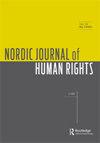Two Paths in the Future Relationship of the European Court of Human Rights and the African Court of Human and Peoples’ Rights
IF 1.2
Q3 POLITICAL SCIENCE
引用次数: 1
Abstract
ABSTRACT There are two potential paths in the future relationship between the African and European Human Rights Courts. One path, brimming with optimism, sees a ‘global community of courts’ engaging in judicial dialogue that contributes to global human rights law. A second path has emerged in a Concurring Opinion to ND and NT v. Spain, a judgment legitimizing pushback of migrants at the borders of Europe. Judge Pejchal suggested that the application should have been struck out, as the applicants could have brought their claim to the African Court if they were unsatisfied with the human rights situation in their home country. This remains the sole reference to the African Court in the jurisprudence of the European Court. It takes place in a context of backlash against both courts in politically fraught areas, and in shared territorial experiences of waves of migration from Africa to Europe. This article presents the two paths of these regional courts and their intertwining futures, focusing on the judicial practices that facilitate dialogue. We explore these paths empirically and argue that aspirations of unity and the cynicism of insularity are likely to be prominent and overlapping themes in the future of regional human rights courts.欧洲人权法院与非洲人权和人民权利法院未来关系的两条路径
非洲和欧洲人权法院之间的未来关系有两条可能的路径。一条充满乐观的道路是“全球法院共同体”参与司法对话,为全球人权法作出贡献。另一条道路出现在“民主党和保守党诉西班牙案”的“一致意见”中,该判决使在欧洲边境抵制移民合法化。Pejchal法官建议,这项申请应该被驳回,因为如果申请人对其本国的人权状况不满意,他们可以向非洲法院提出要求。在欧洲法院的判例中,这仍然是唯一提到非洲法院的地方。它发生的背景是两个法院在政治上充满争议的地区遭到强烈反对,以及从非洲到欧洲的移民浪潮的共同领土经验。本文介绍了这些地区法院的两条路径及其相互交织的未来,重点关注促进对话的司法实践。我们从经验上探讨了这些途径,并认为团结的愿望和孤立的玩世不恭可能是未来区域人权法院突出和重叠的主题。
本文章由计算机程序翻译,如有差异,请以英文原文为准。
求助全文
约1分钟内获得全文
求助全文
来源期刊

Nordic Journal of Human Rights
POLITICAL SCIENCE-
CiteScore
1.00
自引率
25.00%
发文量
29
期刊介绍:
The Nordic Journal of Human Rights is the Nordic countries’ leading forum for analyses, debate and information about human rights. The Journal’s aim is to provide a cutting-edge forum for international academic critique and analysis in the field of human rights. The Journal takes a broad view of human rights, and wishes to publish high quality and cross-disciplinary analyses and comments on the past, current and future status of human rights for profound collective reflection. It was first issued in 1982 and is published by the Norwegian Centre for Human Rights at the University of Oslo in collaboration with Nordic research centres for human rights.
 求助内容:
求助内容: 应助结果提醒方式:
应助结果提醒方式:


